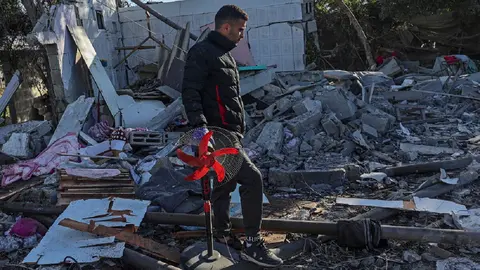Hamas views proposed truce with Israel in Gaza in "positive spirit"

The Palestinian Islamist movement Hamas is taking a "positive view" of a proposed truce with Israel after nearly seven months of a war that has caused "unprecedented" destruction in the Gaza Strip.
After months of fruitless negotiations, Hamas chief Ismail Haniyeh spoke in an upbeat tone on Thursday about the latest proposal for a ceasefire and the release of Israeli hostages seized by the Islamists during the 7 October attack.
The statements fueled hopes for a deal that would give some respite to the people of Gaza, who remain under Israeli bombardment on Friday, according to Palestinian rescuers.
Haniyeh said the group would "soon" send a delegation to Egypt to continue negotiations and that Hamas was studying the proposal in a "positive spirit".
The United Nations Development Programme (UNDP) estimates that it will take decades to rebuild homes destroyed during the war, as "the scale of destruction is enormous and unprecedented" and warned that the international community has not been confronted with a mission of this scale since World War II.
The UNDP predicted that the ravages of the conflict will impact on generations of Palestinians and called urgently for a ceasefire.
"Suffering"
The truce, brokered by Qatar, Egypt and the US, would be the first since late November, when a first agreement saw 105 hostages held in Gaza released in exchange for 240 Palestinian prisoners.
Hamas, which has ruled Gaza since 2007, is demanding a permanent ceasefire and the withdrawal of Israeli troops, which Israel rejects.
The truce plan Hamas is discussing includes a 40-day ceasefire and the release of Israeli hostages in exchange for the release of Palestinians held in Israel, according to details released by the UK.
The war erupted on 7 October after Hamas commandos raided southern Israel, killing 1,170 people, mostly civilians, and kidnapping 250, according to an AFP assessment based on Israeli data.
Israeli authorities estimate that, after the November swap, 129 people are still being held in Gaza, but suspect that 35 of the abductees are dead.
Israel announced Friday the death of Dror Or, a 49-year-old hostage, and the kibbutz where he lived demanded that Hamas return his body.
Israeli Prime Minister Benjamin Netanyahu faces protests that his far-right government should negotiate the release of the hostages.
Israel's offensive in response to the 7 October attack has so far left 34,596 people dead in Gaza, mostly civilians, according to the Hamas government's Health Ministry.
US Secretary of State Antony Blinken was in the Middle East this week and visited Israel on Wednesday. During his trip, he urged Hamas to accept the proposal, which he called "extraordinarily generous".
Blinken also reiterated to Israel that the US opposes its plan to launch a full-scale invasion of Rafah, a southern Gaza town where 1.5 million Palestinians survive in dire conditions.
"Hunger"
The humanitarian crisis and rising death toll in Gaza have sparked demonstrations around the world, including a large protest movement on US campuses, which was suppressed by police.
Colombian President Gustavo Petro announced on Wednesday that he was breaking off relations with Israel, and Turkey said on Thursday that it would suspend trade.
A key issue is the arrival of more humanitarian aid to Gaza, home to 2.4 million people, who are facing severe shortages because of Israel's siege.
Under pressure from the US, Israel has increased aid inflows in recent days.
The US-based World Central Kitchen resumed operations this week, after the organisation founded by Spanish chef José Andrés suspended operations following an Israeli bombing that killed seven employees.
"When this kitchen closed, many people were left hungry," said Zakria Yahya Abukuwaik, the administrator of a World Central Kitchen centre in Rafah.










